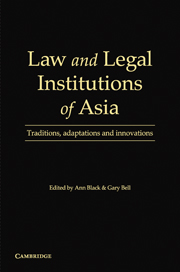8 - Indonesia
The challenges of legal diversity and law reform
Published online by Cambridge University Press: 01 June 2011
Summary
Introduction
Indonesia's national motto, ‘Bhinneka Tunggal Ika’, is often translated as ‘Unity in Diversity’. When it comes to law, Indonesia truly abides by this motto – it is one of the most legally diverse, and consequentially legally complex, countries in the world. Indonesia is the largest majority-Muslim country in the world, yet it is not an Islamic state, even though it does implement important parts of Islamic law. It is a civil law country even though much of its Civil Code and Commercial Code are no longer in force, having been replaced by statutes, some allegedly inspired from adat law, the indigenous laws of the different ethnic groups that make up Indonesia. These adats or adat laws reflect a great diversity in law, the adat of each ethnic group being different. Religious diversity is recognised through freedom of religion provisions in the Constitution and through the recognition of the legal consequences of religion – for example, Muslims will have Islamic family and inheritance law applied to them (sometimes as modified by adat and by state law) but Christians will have their religious marriage given the legal effect of a civil marriage by the state which corresponds in large part to their religious beliefs (a monogamous marriage, for example). Indonesia takes legal pluralism seriously as a mean of respecting the diversity of its citizens.
This diversity makes Indonesia one of the most fascinating jurisdictions for anyone interested in comparative law and legal pluralism.
- Type
- Chapter
- Information
- Law and Legal Institutions of AsiaTraditions, Adaptations and Innovations, pp. 262 - 298Publisher: Cambridge University PressPrint publication year: 2011
References
- 2
- Cited by



